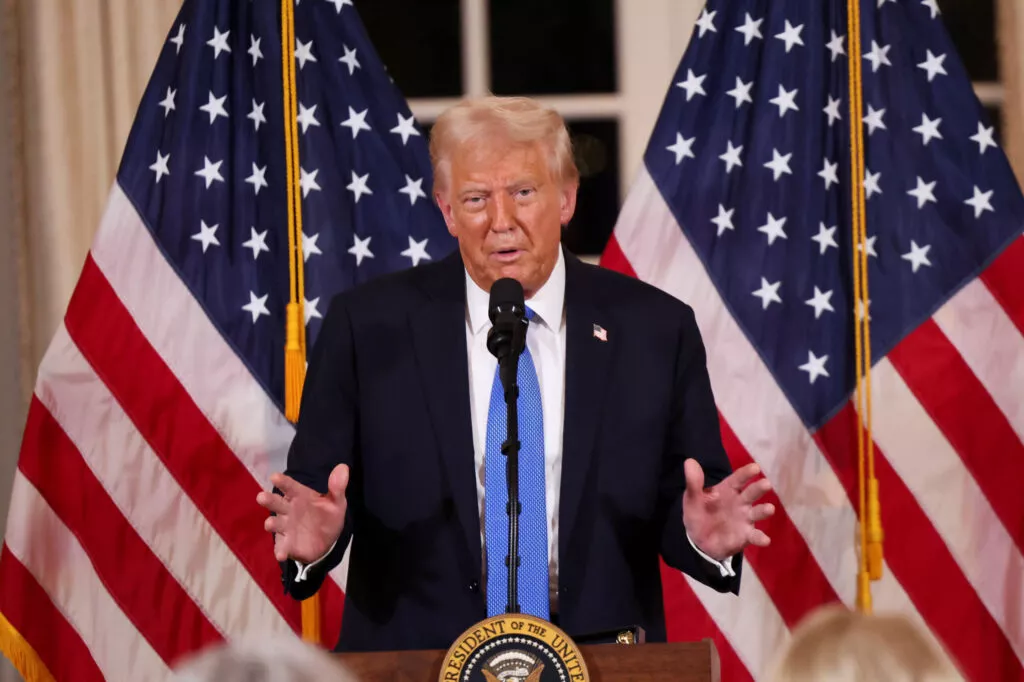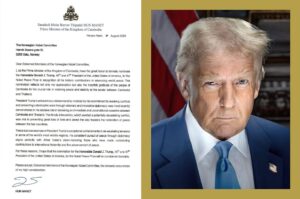Trump’s trade madness risks global depression if retaliation’s not measured
Donald Trump’s import tariffs on Mexico and Canada will push the United States back to protectionism not seen since WW2. A more effective response would be to reassess intellectual property rules that disproportionately benefit US pharmaceutical and tech giants at the expense of global consumers while working collectively with Asia and Europe to reinforce the rules-based economic system.
Donald Trump — a man whose career is so thoroughly littered with scams that other scams to which he is not personally connected nonetheless orbit around him like small satellites — has no concept of mutually beneficial trade, which is the most fundamental principle of economics. For him, every interaction has a winner and a loser, and the United States cannot let itself be a loser in any circumstances.
This is the underlying logic that has led the world to the brink of the most catastrophic of Trump’s trade wars, with the (now delayed) imposition of 25 per cent tariffs on imports from Mexico and Canada, two economies with which the United States is deeply intertwined. Seamless supply chains that run the length of North America would likely be damagingly severed by the tariffs.
The net effect of these tariffs alone, it is estimated, will be to return the United States to the same level of overall protectionism as in 1946, two years after the Bretton Woods conference which shaped the post-war international economic order, significantly to the benefit of the United States. There is a bitter irony in the fact that the first plank of Bretton Woods — fixed exchange rates — broke down partly because European allies, particularly France, resented the fact that it allowed the United States to run endless trade deficits, supported, they thought, by the ‘exorbitant privilege’ of controlling the system’s reserve currency.
Now, it is Washington that resents its own privilege and wants to tear down the existing order to export the US domestic governance disorder of ‘might is right’ to the rest of the world. Trade deficits — which Trump sees as the ultimate evil — are the mathematical counterpart of foreigners’ willingness to invest in US productive assets, because they have over the years seen the United States as the best place to do business. If Trump succeeds in substantially reducing the US trade deficit, it will only be because he has successfully convinced the rest of the world that the policy environment in the United States is too risky for long-term foreign investment.
More tariffs are on the way.
When the United States imposed the Smoot-Hawley tariffs of 1930, it was a return to the high tariffs of the 19th century, and rates were surprisingly similar to those Trump is now proposing, peaking at around 60 per cent (what Trump has threatened China with) and averaging around 20 per cent — the level Trump has threatened for all imports. What made the Smoot-Hawley tariffs so dangerous was not so much their level but the catastrophic cycle of retaliation that followed. Empires built high walls around themselves, and world trade collapsed.
It is this political dynamic that makes the present situation so dangerous. If Trump tries again to impose tariffs when the negotiated month’s delay is over, Canada and Mexico will feel politically bound to retaliate. The European Union — currently bracing against Trump’s attention — can be expected to do likewise, having already done so during Trump’s first administration. Retaliatory tariffs may seem like a clever way to stand up to a bully, but the economics are clear, and they are bad. A cycle of retaliation and contagion, which will certainly not stop with Canada or Europe, would propel the world towards a 1930s style prisoner’s dilemma epic fail.
So is there a less damaging way to respond that still meets the political challenge of not seeming weak in the face of economic aggression? One way would be to renounce the hold that US preferences have on the intellectual property rights regime of many countries that have signed free trade agreements with overly stringent copyright and patent protections.
Few would argue against protecting intellectual property rights as a general principle. But the United States has gone overboard, favouring the interests of pharmaceutical giants and tech companies at the expense of global consumers. That results in direct transfers of wealth through huge flows of fees and royalties to the United States and stymies innovation in the rest of the world for unreasonably long periods of time, even in other industrial economies.
Signing up to intellectual property provisions in trade agreements and in the World Trade Organization itself was the price to pay for access to the US market and now that access is being revoked. Countries that feel a need to retaliate against the United States could consider undertaking a review of their intellectual property regimes that prioritise economically inefficient restrictions that benefit US rent-seekers. This would not only ‘punish’ bad behaviour but also increase economic welfare. It should not be a bargaining chip that can be taken off the table if Trump folds: reforms to intellectual property rights should be permanent.
China’s response to 10 per cent tariffs on all its imports, on top of the already close to 20 per cent in place from the US–China trade war, has been to impose symbolic tariffs on its modest imports of US energy and to initiate antitrust action against Google. It is also set to appeal to the global trade referee, which has been paralysed by deliberate US sabotage. Tit-for-tat retaliation didn’t get the Chinese very far in Trump 1.0.
What is needed is collective action led by Asia and Europe — where trade openness is an economic and political security imperative — not against the United States, but for the global public good of an open, rules-based economic system. The established system is far from perfect but the alternative is chaos and economic and political insecurity.
Shiro Armstrong is Professor of Economics in the Crawford School of Public Policy at The Australian National University and Tom Westland is a Postdoctoral Researcher at Wageningen University, and a Non-Resident Fellow at the East Asian Bureau of Economic Research in Crawford.







